Gay conservative pundit Darren Grimes doesn’t think LGBT+ people need Pride anymore. He couldn’t be more wrong
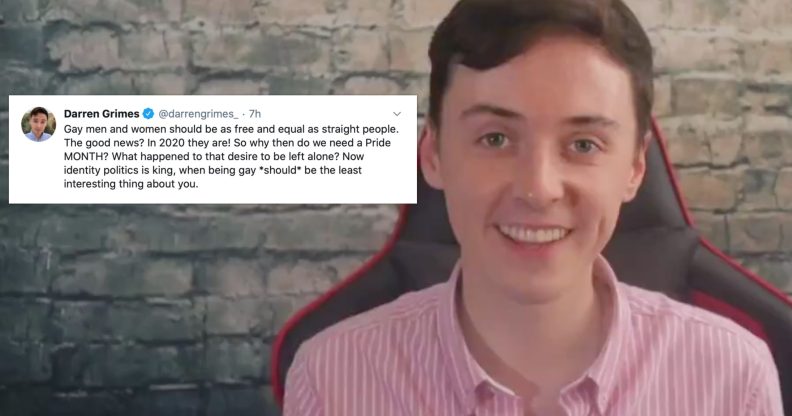
Darren Grimes tweeted his bemusement at why LGBT+ people “need” a Pride Month. (Screen capture via Twitter)
Gay right-wing commentator Darren Grimes became a lightning rod for criticism on Monday (June 1) after questioning why there is a need for Pride Month.
The British Brexit campaigner, fresh from imploring homophobes to “come out of the closet” and join his digital safe space group, apparently reserved his barbs not for homophobes, but for… those celebrating Pride month.
Darren Grimes really took the time to decide to tweet that straight and gay people are “equal” as two events unfolded around him – a reignited wave of Black Lives Matter protests and Pride organisers, battered by the coronavirus pandemic, sending a renewed message of solidarity with queer and trans people of colour.
Darren Grimes tweets that LGBT+ and straight people are ‘equal in 2020’.
“Gay men and women should be as free and equal as straight people,” Darren Grimes wrote in a broadside against the ruling Conservative Party for changing its Facebook page branding to the colours of the six-striped Pride flag.
https://twitter.com/darrengrimes_/status/1267373164557991937
“The good news? In 2020, they are! So why do we need a Pride MONTH? What happened to the desire to be left alone?
“Now identity politics is king, when being gay should be the least interesting thing about you.”
Marriage equality might be used by some as a benchmark for equality, but the fight for equality is not nearly as simple. So, here are 11 reasons why Pride is, in fact, still needed.
1. There are, in fact, members of the LGBT+ community who are not ‘gay men and women’.
https://twitter.com/October_Fist/status/1267424887599239168
Grab a glass of water and settle your stomach because we have some very hard pills for you to swallow.
Yes, this might comes as a shock. Yes, it might startle you, blow your mind, rattle you to your very core to learn that the LGBT+ community is not just “gay men and women”.
Bisexual and pansexual folk exist, for a start, and bi+ communities are more likely than gay men and lesbians to experience mental ill-health. Their identities often erased or mired by misinformation and toxic attitudes.
Moreover, Grimes’ myopic statement leap-frogged over the trans community – one of the most marginalised and vulnerable demographics in the nation.
2. Hate crimes against queer people are soaring in England and Wales.
Excuse me? https://t.co/3H9Os33csM pic.twitter.com/cQ0Kj5xyKg
— Hannah (@orangarnold) June 1, 2020
Earlier this year, a photograph of a queer couple covered in blood, their faces visibly distressed, leapt onto headlines and front-pages across the world.
Their names were Melania Geymonat and Christine Hannigan.
The attack on the couple became the apex of a soaring spate of violence against LGBT+ citizens, shocking statics have shown.
More than 11,500 reported hate crimes occurred in England and Wales in 2017-18, and this figure has continued to surge each year, totalling 14,491 between 2018 and 2019.
One in five LGBT+ people, advocates warn, have experienced a hate crime or incident in the last 12 months.
This figure only swells for trans people, where 40 per cent of trans people have been subjected to an anti-trans hate crime in the last 12 months.
3. Pride is needed now more than ever before, especially for Black queer folk.
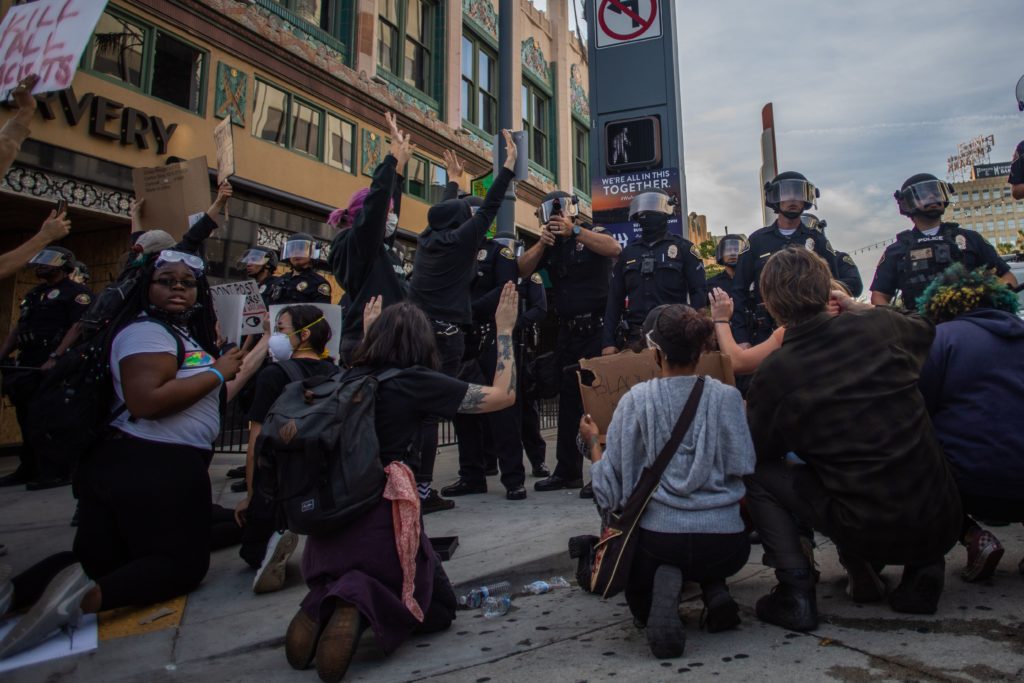
Demonstrators kneel in front of a police line with their hands up while a police officer takes aim towards the crowd in downtown Long Beach on May 31, 2020. (APU GOMES/AFP via Getty Images)
For the last seven days, major cities across the US have been dotted by civil unrest.
The death of George Floyd, a 48-year-old Black man, after a white officer pinned him down on the throat with his knee erupted into a renewed Black Lives Matter protest.
Images of milk-drenched demonstrators, boarded-up businesses tagged with messages against police brutality and officers thronging thoroughfares in square-offs against protesters – it all attests to an anger felt by Black folk for centuries-long discrimination by white supremacy.
As these riots stretch into Pride Month, many LGBT+ community leaders spoke of a renewed urgency in reflecting on the past. How the Stonewall Riots of 1969 were, at its core, carried out by queer and trans women of colour.
Figures such as Marsha P Johnson, Sylvia Rivera and Miss Major Griffin-Gracy – they all pushed the community to shine authentically and to become a scream of subversion that refuses to retreat into the shadows.
This sober awareness of Pride not being simply about rainbow make-up palettes and cheap vodka shots, but about how dissident uprisings are an integral part of the fight for progress, has become amplified by the Black Lives Matter movement.
4. Poland is now a patchwork of ‘LGBT-free zones’.
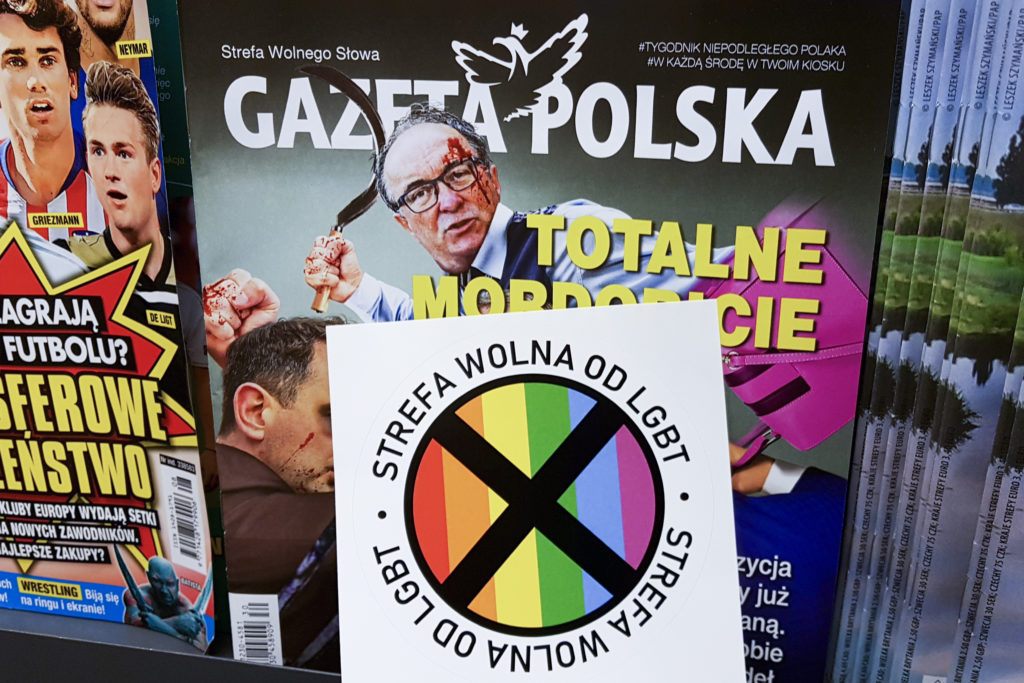
LGBT-free Zone stickers distributed with Polish conservative weekly magazine Gazeta Polska. But, no, Darren Grimes doesn’t think we need Pride anymore (Beata Zawrzel/NurPhoto via Getty)
In the last year, more than a third of Poland has pledged to become an “LGBT-free zone”, vowing to refrain from acts that encourage tolerance and to avoid providing financial assistance to NGOs working to promote equal rights.
Right-wing populists in the country seeded hatred in the throes of the general election, where the country’s Law and Justice Party picked the LGBT+ community as its enemy.
Lawmakers and religious leaders began to spread poisonous propaganda in an attempt to net a political windfall, placing anti-LGBT+ figures as a defanged majority.
Ultimately, the Law and Justice Party scraped a majority in the 2019 elections, pockmarking the country into a terrifying patchwork of regions that support the community and those who do not.
5. In a dozen jurisdictions, the death penalty for gay sex is a daily reality.
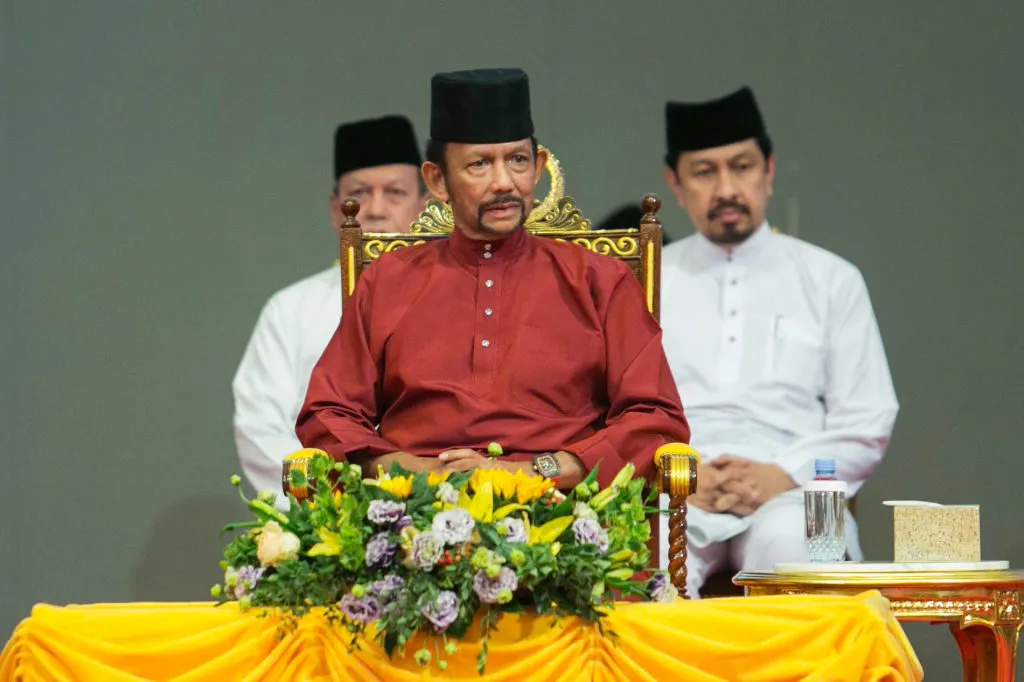
In March 2019 the Sultan of Brunei called for strict new Sharia punishments, including death by stoning for gay sex. We assume Darren Grimes simply forgot about this in his tirade against Pride (AFP/Getty)
Penal codes – many the import from colonial pasts – in 12 jurisdictions prescribe the death penalty for homosexuality.
Afghanistan, Iran, Mauritania, Nigeria, Pakistan, Qatar, Saudi Arabia, Somalia, Sudan, Yemen and the United Arab Emirates all enforce capital punishment while a lofty “de facto” moratorium was lodged in Brunei on its anti-gay execution laws.
The threat of death has winnowed fear into each of the region’s LGBT+ communities, and many countries since have considered introducing it – in 2019, Ugandan lawmakers plunged queer folk in fear as they debated a “Kill the Gays” bill.
Though it was struck down, it touched off the growing concerns felt by many that rights are fickle and flimsy and can be back-pedalled and dismantled at any notice.
6. Conversion therapy is still rampant and is perfectly legal in Britain and beyond.
Have you banned conversion therapy yet? https://t.co/d6lM2icS2B— David Ames (@semadivad) June 1, 2020
In early May, activists harpooned the Conservative government for its sluggish progress in banning conversion therapy.
Sometimes referred to as reparative therapy, the harmful and widely discredited practice has been compared to torture on some accounts. The Tories pledged to end conversion therapy yet, two years on, and there has been no measurable progress.
Moreover, techniques across the world have ranged from ice-pick lobotomies to chemical castration. Nevertheless, just three countries in Europe have banned it and it remains prolific in African and Asian countries as well as many US states.
7. It’s 2020, and people are literally still too scared to hold hands with their same-sex partner.
https://twitter.com/alfiewm_/status/1267411327577927681
For heterosexual couples, holding hands with a partner is a casual milestone that happens without concern for what strangers may think.
But for queer couples, the simple act can incite verbal and physical violence against them.
Indeed, a recent Europe-wide survey found that the bulk of LGBT+ Europeans fear holding hands in public. As much as more LGBT+ people than ever before are living openly, researchers said, progress has stalled or even slid backwards.
Six in 10 respondents said they avoid holding hands in public with their partners for fear of harassment or assault, and violence remained high, with one in 10 respondents saying they had been sexually or physically assaulted in the last five years for being LGBT+.
8. Teachers in Britain wanted to teach LGBT+ lives. Parents fought back and protests rumbled for months.
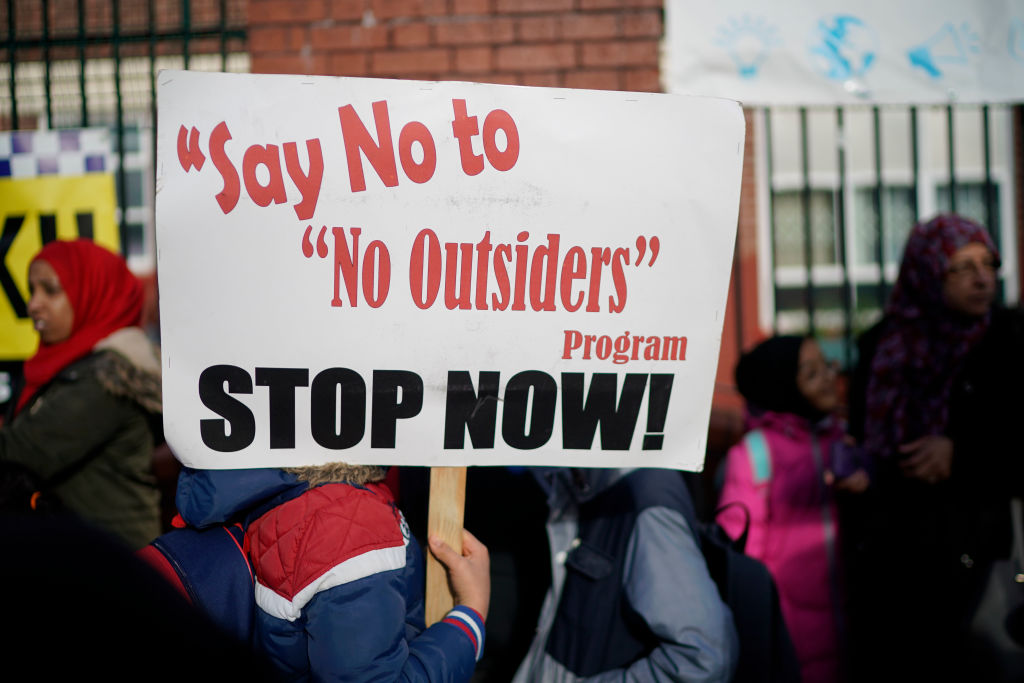
Protestors demonstrate against the ‘No Outsiders’ programme at Parkfield Community School on March 21, 2019 in Birmingham, England. (Christopher Furlong/Getty Images)
Teachers in Birmingham moved to make curriculums more LGBT-inclusive and lawmakers voted to make queer sex and relationships teaching mandatory in 2019.
But soon enough, crowds began to gather outside primary schools in the West Midland city. Parents picketed and pulled their children out of education, roaring at school leaders for simply wanting to teach that, well, queer people exist.
Darren Grimes himself reflected on this at the time.
https://twitter.com/darrengrimes_/status/1108067507313639424
We’re not sure how LGBT+ people suddenly ticked every single legal rights box between then and now, but apparently, it’s happened.
Well, now LGBT+ community are as free and equal as straight people, maybe it’s time to go donate some blood!
Oh, wait.
9. Trans rights, or rather, the increasingly lack thereof in Britain.
https://twitter.com/JaviGarna/status/1267402769582956544
Trans rights have emerged in recent years as a flashpoint in Britain’s culture wars, where lawmakers, columnists and many other cis people in power have made it their prerogative to squash all potential progress.
Transphobia is, frankly, everywhere in the UK. In newspaper adverts and political cartoons, on radio airwaves and television panels.
All the while, equalities minister Liz Truss has begun to lay-out her blueprints for the Gender Recognition Act which alarmed concern from parents of trans youth, LGBT+ organisations and political parties alike for it appears to be a direct threat to healthcare for trans youth.
Many have, as a result, expressed their worry that the future of trans rights has been thrown into jeopardy.
Trans and non-binary people are painfully aware at the distrust and disgust levelled on them on a daily basis, watching as news tickers and lecture halls hold “debates” on whether or not they should be “allowed” to exist.
For those who do back trans rights, opponents have compared them to child abusers.
For medics who provide healthcare to trans teens are compared to Nazi doctors during the Holocaust.
10. An epidemic of violence is inflicting trans people worldwide.
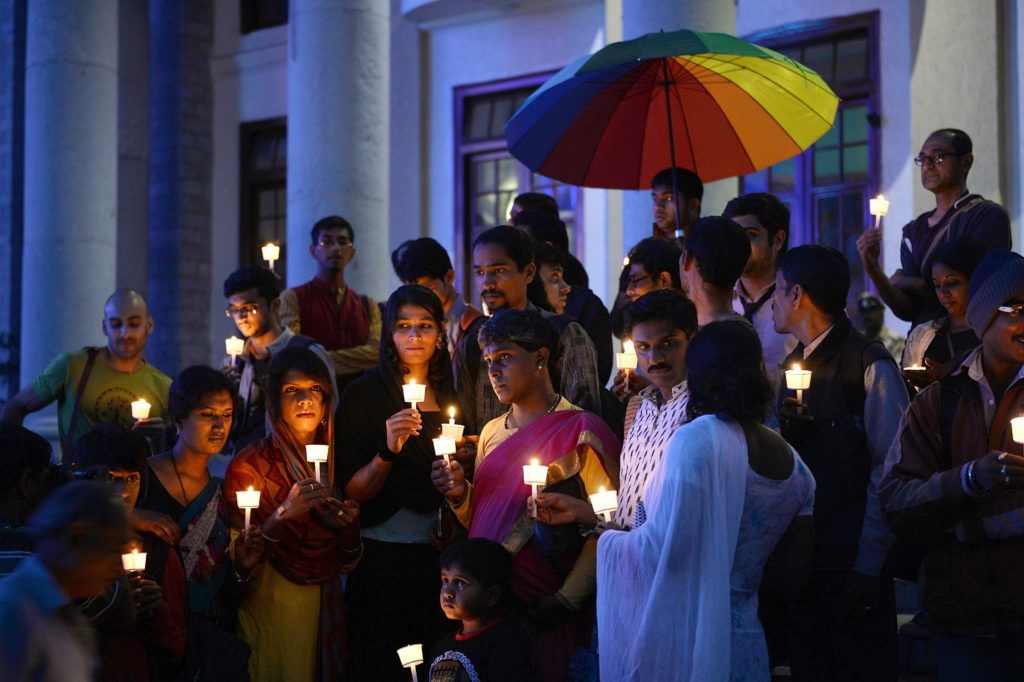
Transgender activists and their supporters take part in a candle light vigil held as part of Transgender Day of Remembrance. (MANJUNATH KIRAN/AFP via Getty Images)
Moreover, since 2008, 3,317 trans and non-binary people have been recorded as murdered, and that figure, activists warn, is even higher.
A report by Transrespect versus Transphobia Worldwide (TvT), initiated by Transgender Europe, has been published every year since 2008 for Transgender Day of Remembrance, listing the recorded murders of trans and gender-diverse people since the last report.
Since the report began, 3,314 murders in 74 countries have been recorded, and 331 trans people were killed this year alone, between October 1 2018 and September 30 2019.
Many of the victims in the report were tortured, sexually assaulted, shot, hanged or burned.
11. Chechneya authorities ‘purged’ gay people in a brutal wave of torture and kidnappings. And nobody seemed to care.
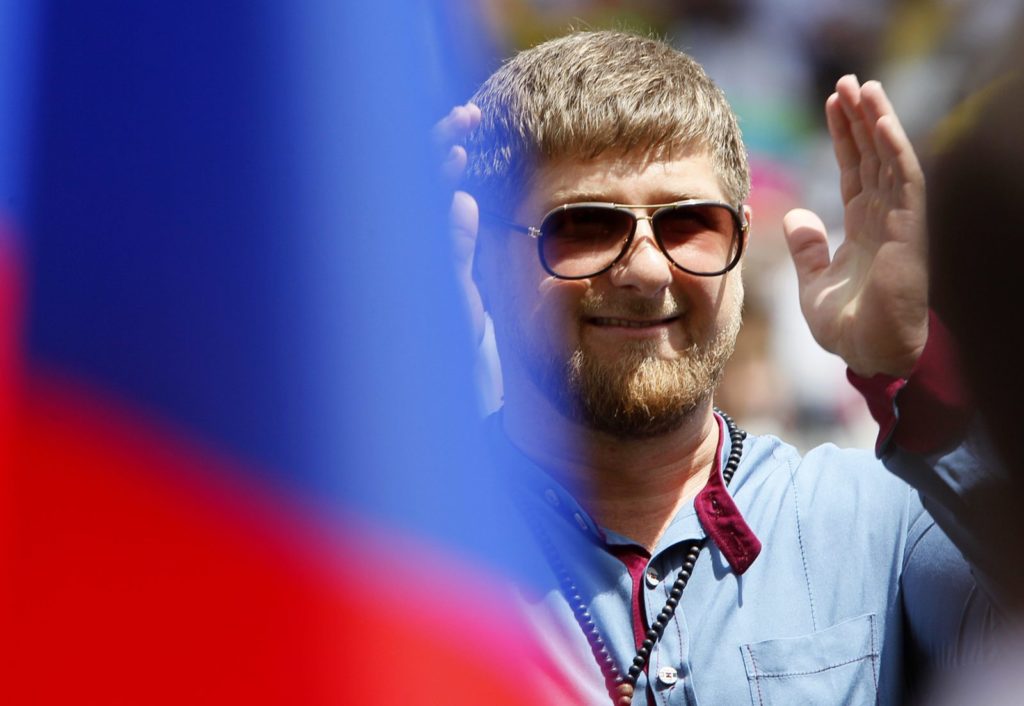
Need further proof we need Pride, Darren Grimes? Here’s Chechnya’s president Ramzan Kadyrov (Photo by Dmitry Korotayev/Epsilon/Getty Images)
Since the collapse of the Soviet Union, Chechnya, a republic nestled in the mountains of Russia’s southern brother, has wrestled with violence.
Being gay is taboo in Chechnya, a primarily Muslim nation, which pushed the lives of many queer folk into private online chat rooms and darkened alleyways.
But one day, this all changed.
Scores of queer men suffered weeks of torture and brutal beatings in a targeted pogrom by the pro-Kremlin leader, Ramzan Kadyrov, in a horrifying turn in the country’s long history of human rights abuses.
Local authorities denied the crackdowns ever happened, but journalist Elena Milashina and human rights lawyer Marina Dubrovina hurled countless cases of kidnapped gay men into the public eye.
Witnesses have painted a brutal playbook of Chechen regional authorities bundling gay men into cars, thrown into basements of police stations or thrown into facilities where they were tormented and starved.

